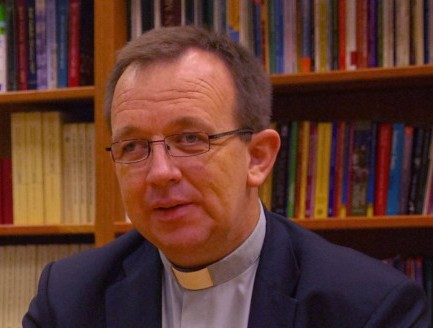Bishop Tom Deenihan launched Catholic Schools Weeks 2024 with a special Mass in the Cathedral of Christ the King, Mullingar, with representatives of the Catholic post-primary schools in the parish: Saint Finian’s, a co-educational post-primary school under the Patronage of the Bishop; Saint Mary’s, a boys post-primary school under the Patronage of ERST; and, Loreto Girls Post Primary School under the Patronage of the Loreto Schools Trust.
Each year in January Catholic Schools Week is celebrated by school communities across the island of Ireland. The 2024 theme celebrates the local school’s service to friends, family, the local community, and to faith.
During his homily at Mass, Bishop Deenihan preached, “The gospel relates how Jesus invited and gathered the apostles around him. It was an invitation but the personality and witness of Christ must have influenced the response of Simon, Andrew, James and John too. In many ways, today’s gospel is a challenge to the Catholic school. The personality and the witness of Christ must inform the teaching and management of Catholic schools and the school, by its actions, must invite its pupils to encounter Christ.
“Much has been written about Catholic schools. There can be some confusion about what a Catholic school is and does. For some, it is an excellent academic education, for others, it is a more general and broad contribution, bearing in mind the needs of the student. Unfortunately, others see it as indoctrination. The reality is broader.
“The Catholic school must embody respect. Respect for the individual student with their own distinctive talents and characteristics and respect for others, also made in the image and likeness of Christ. Respect for others is a key task for schools and society. Catholic schools, conscious that we are made in the image and likeness of God believe this to be true and it is and must be a key characteristic of any Catholic school. Faith in Jesus Christ has something to inform and influence debate and actions in this regard.
“Faith cannot be compartmentalised to a Church on Sunday morning, but must have an influence on how we act and on what we say. Indeed, the issue of respect – and respect for others – is a key one for our time and has come to the fore in Irish society in recent weeks, particularly in relation to those from other countries and those from our own country seeking accommodation.
“I must mention the teachers who teach in our schools, those who know and who respect their students, those who acknowledge difference and those who support, not just academically, the students with many varied abilities and gifts. Our teachers are integral to the mission of the Catholic school and they have our thanks and our admiration. The voluntary work of Board members must also be acknowledged. Their dedication is further evidence of the esteem in which such Catholic schools are held. If we value something, we will work for it and give our time to it.”
“Faith is too important for our Church and our students to be diluted by ideology and political correctness. Our students need a vision and the reassurance of a God who loves them, they need a sense of a compassionate Church, they need a way of expressing their faith and they need hope for the future. They need a sense that we are born for more than what this life can offer. That is the importance of a faith-based education. You, I, and society as a whole must be careful at this time that we do not close the door to faith and deprive our students of the hope, consolation and direction that faith can offer. Faith is not an empirical or comparative study – it is an encounter, an invitation and an openness to God in our lives. True plurality, be it in society or in education, will always support and encourage faith, as it will those who do not profess faith. Plurality or inclusion cannot be against faith otherwise it is a mere ideology,” Bishop Deenihan said.
For the full text of Bishop Deenihan’s homily, click here.
ENDS


